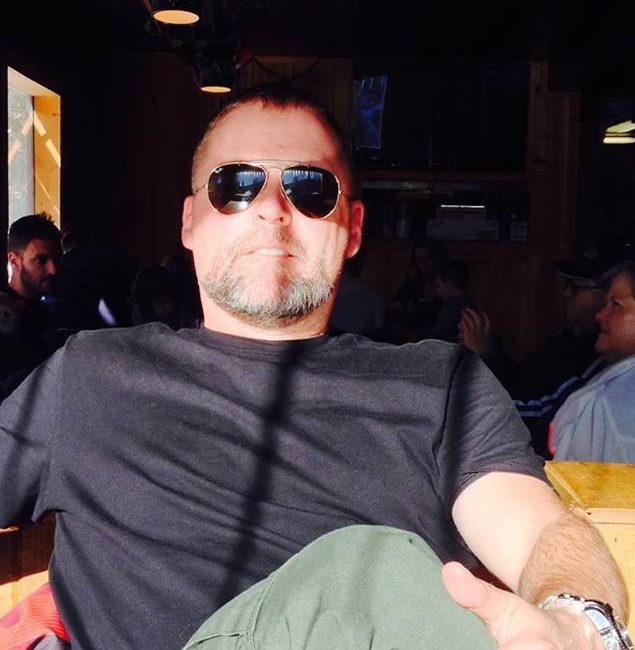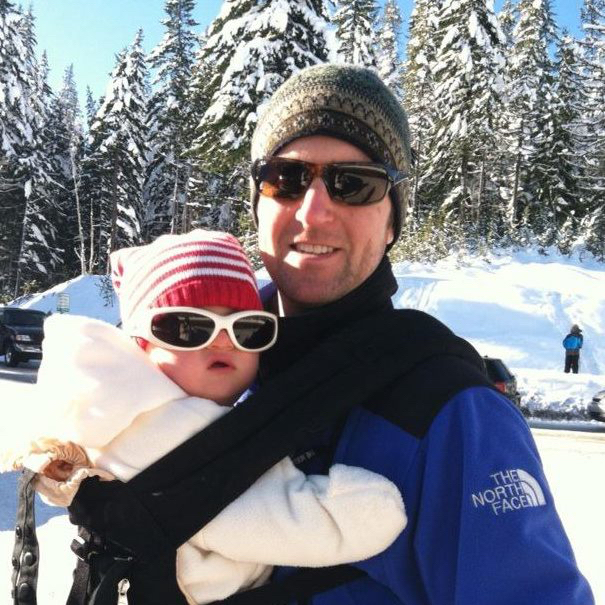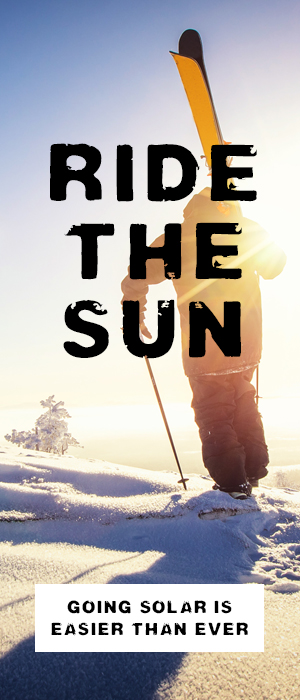This is a story about a ski buddy of mine who has Parkinson’s, and about a motorcycle trip he recently took that meant a lot to him. It’s a story about what it’s like to get Parkinson’s when you are young, what that disease takes away, and how people adapt and keep moving, sometimes in surprising ways. It is also a story about the importance of community.
If you spend a lot of time on Mount Hood, you’ve probably come across Mike Heffernan at some point. He’s a former cop and an excellent skier, a smooth-at-all-speeds racer, with two really nice kids, Mac and Kennedy. Maybe you’ve met him on the chair lift, and he cracked you up with some totally unexpected comment. Or maybe you caught a blurred glimpse of him ripping past Charlie’s on his motorcycle at 1 am. Or maybe you noticed him suddenly freezing up in the lodge, his left leg locked stuck. Is this the same guy who was just tearing down the mountain at 50 miles an hour in perfect control?
“I’m just a regular guy who came down with Parkinson’s,” Mike says. “I don’t want it, I didn’t ask for it, I don’t feel like I did anything to deserve it. And yet here I am.”
Mike Heffernan is 52, and he has been living with the neurological disorder know as Parkinson’s for about 10 years, maybe longer. He didn’t tell anyone about his symptoms for years, partly because he was worried he would lose his job with the Multnomah County Sheriff Office. But he could only hide it for so long. In the end, he did lose his job because of Parkinson’s, and that loss was devastating to him. “I was headed down the road of self-destruction,” he says.
It may seem odd that someone heading down the road of self destruction would recover his equilibrium through fast skiing, intense motorcycle riding and exhausting physical exercise, but in Mike’s case those are precisely the things that have brought him back to what he calls “the process of living.”
‘My Parkinson’s is just happy as hell when I’m on that bike’
Mike’s version of Parkinson’s is strange, though not as unusual as you might think. He can ski mountain steeps at 50 miles an hour, race across the high dessert at 120, drop down and crank out one push-up after another — but walking is not always easy for him. Sometimes he freezes up so badly that he will simply fall backwards. More often he will catch his symptoms before they incapacitate him, and break into a vigorous run to fend them off. People think he’s joking, but it’s real.
“When I can’t walk I can run,” he explains. He says his Parkinson’s is “just happy as hell” when he’s on the slopes or on his bike: “As long as I am active, as long as I am using my mind and looking ahead and mentally interested in what’s going on, I have no symptoms. I can ride seven hours, eight hours, no problem.”
That’s what he did on his recent motorcycle trip up to Canada by way of George, Washington, Sun Valley and Glacier National Park. He rode up to see the Dave Matthews Band in the Gorge for Labor Day Weekend, brought along his tarp and bedroll in saddle bags with bungee cords, and headed out from there to meet people and have adventures. He caught up with old friends in Sun Valley, befriended a guy with Parkinson’s who runs a pub in Idaho, sang with a street musician in Missoula, met some Montana smoke-jumpers, traded crazy-fast turns with a fellow biker dropping down from Galena Summit into Stanley Basin with the cliffs on one side and the water on the other, went for long swims in motel pools in the middle of the night and deftly avoided some potentially hazardous situations. I’ll let him fill in the details on that story down below, in his own words.
Mike took a similar route to Montana and Canada about 20 years ago on a motorcycle trip with his buddy Rocky Graziano, a fellow sheriff’s deputy. Rocky says it was an experience he will always remember. “We’d end up somewhere out in the middle of nowhere and there’s Mike, talking with someone like they were best friends. I’d ask him how they knew each other and he’d say, ‘We just met.’”
Mike served as best man at Rocky’s wedding. They worked together on the Willamette River Patrol. Rocky had noticed a certain stiffness to Mike’s motions over the years, but he didn’t know it was Parkinson’s, didn’t even really know what Parkinson’s was, looked it up after learning that his best friend had it. He says he felt really bad when Mike had to leave his job, because he knew how important it was to him.
Another long-time friend of Mike’s, Todd Lautenbach, understands what Mike is going through because he also had to retire early from law enforcement work. Todd got badly injured while diving in the Willamette River on duty, nearly died 60 feet beneath the surface, and has struggled hard with post-traumatic stress disorder and depression. He and Mike went through the academy together and excelled as motorcyclists and cops, and now they are both struggling with what comes next. “I so respect that Mike is able to keep pushing it the way he does,” Todd says, “because I know it isn’t easy.”
Kimberly Berg also understands how hard the ride back from a Parkinson’s diagnosis can be. She works with people with Young Onset Parkinson’s as exercise coordinator with the Brian Grant Foundation, an organization set up by Portland Trail Blazer Brian Grant, diagnosed with Parkinson’s at age 36 in 2008.
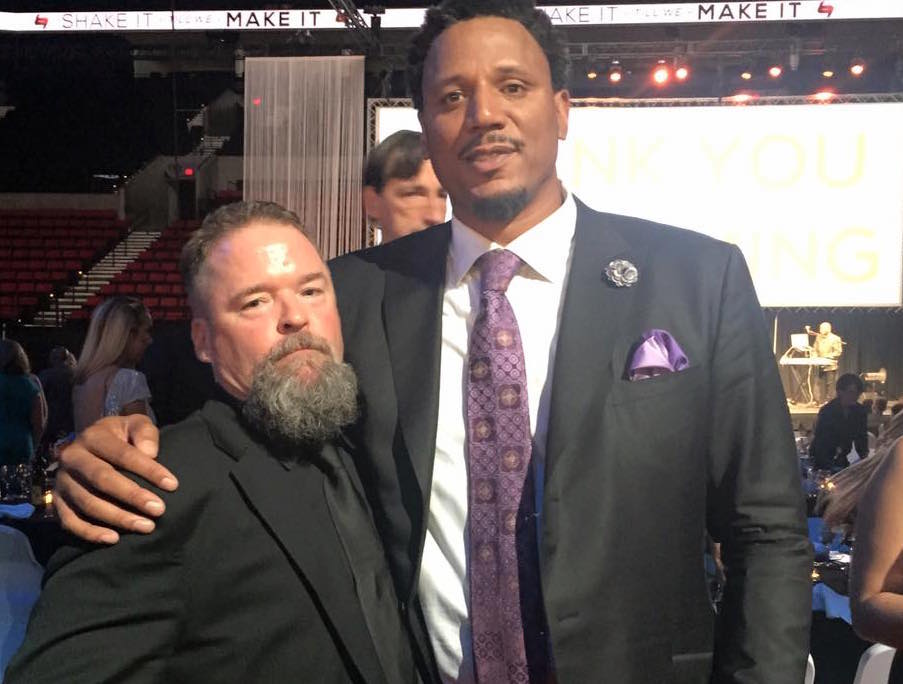
“It’s hard to listen to their stories sometimes,” Berg says. “In Mike’s case, it was particularly hard. They took away his badge and his gun. He identified with that job and he loved it. It just busted his spirit to lose that. He sunk so low that we was considering suicide.”
Mike credits his Brian Grant Foundation workouts with Kimberly Berg, Emma Kingston, and his Parkinson’s buddies with saving his life:
I started out thinking I don’t really want to live with Parkinson’s, and I don’t know how strong I am. I may just die accidentally, I don’t know. I don’t know if I want to live with this disease. I’m already tired of it and I haven’t had it very long. But within a month or two, working out with these guys, doing circuits, exercises that are good for neurological disturbances, I just took everybody to the side and said, ‘Listen, as much joking as I do, and as much sarcasm as I have, if I didn’t have you guys right now, I’d have nothing, and I wouldn’t even be here. You guys saved my life. You re-routed my energy in a way where I’m excited to be here and I’m excited to be alive.
‘Just a Taste of What Will Come’
The day after our interview, I received a text from Mike explaining the importance of his new community. “I was instantly and forever changed after being surrounded by my instructors and class mates,” he wrote. “The Brian Grant Foundation turned my mind and body strong and I started the process of living. My bike trip is just a taste of what will come.”
Folks from the Mount Hood community are also rooting for Mike as he adapts to life with Parkinson’s. The Heffernan family is well known on the mountain since about 45 years ago when Mike, his sister Colleen and their brother Tim first got out on the snow with their bear claw bindings and leather boots. The family took up ski racing over time, and Mike got deep into the speed events after moving to Sun Valley his junior year in high school, including downhill races. He still believes that downhill racing is “the most exhilarating thing you can do on skis,” which helps explain why he can still rip it in his 50s, with Parkinson’s. Arcing a skid-free turn at high speed is embedded in his muscle memory, Parkinson’s or no.
Here’s a photo of Mike with his longtime racing buddy Willy Scroggins:
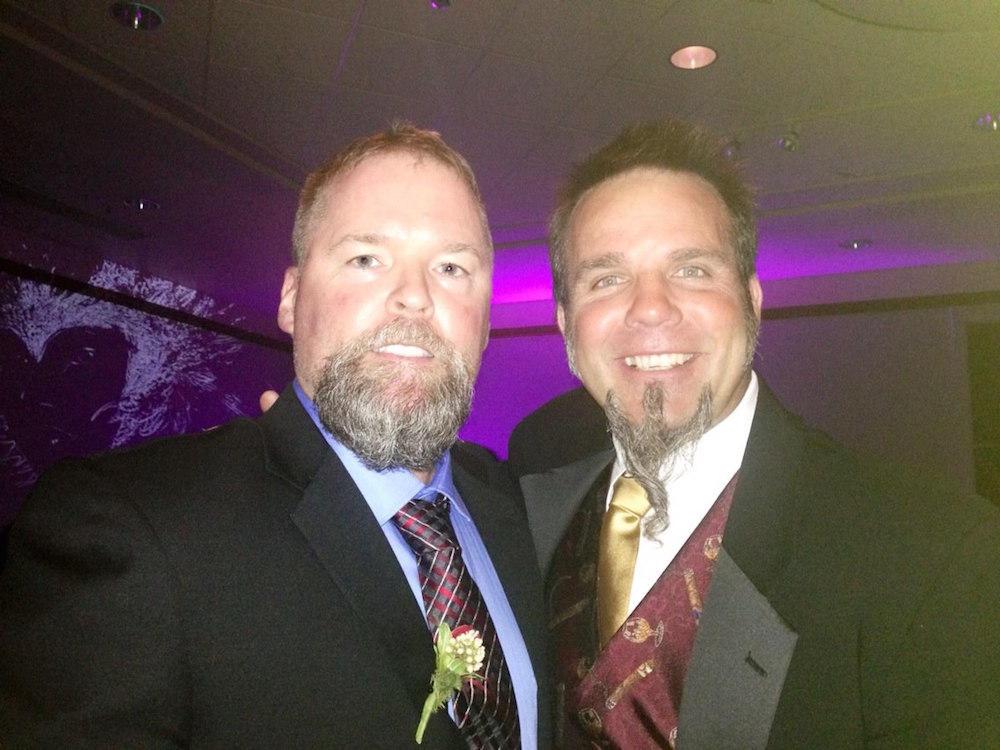
Some of Mike’s ski buddies, like those of us who join him each year for Ski to Defeat ALS, know about his Parkinson’s diagnosis. Others have no idea. Either way, skiing with Mike is a blast.
“Most of our members have known Mike long before his diagnosis, when he was a dedicated cop and a family man,” says Schnee-Vogeli Ski Club President Peter Dodd. “But when the new guys meet him, they say, ‘What’s up with him?’ when he does or says something unexpected. Next thing you know, he’s best friends with the new guy. And now his Schnee brothers both old and new would do anything for him.”
That’s a sentiment shared by Mike’s buddies from the Multnomah County Sheriff Office. “Mike scares me sometimes,” says Todd Lautenbach. “I don’t want to lose him as a friend. But I guess if there’s a way to make the best of having Parkinson’s, Mike will figure it out.”
“Mike’s is just gonna live life right up to the end,” predicts Rocky Graziano. “He is a real fighter.”
No doubt. Now back to that road trip of Mike’s. Let’s pick it back up out in La Grande bound for Canada by way of Sun Valley and Missoula, in Mike’s words:
So I woke up the next day in La Grande, looking at another seven hours to Sun Valley. I’ve still got childhood friends in Sun Valley, I graduated from high school there, raced on the ski team for three years, so I know people in the community.
But first I wanted to hit Twin Falls to meet my friend Todd Roth who owns several dairy farms. I spent the night there and just had a blast. It was amazing. State of the art everything when it comes to milking cows. And they have like six cows being born every day. Constantly. Every day.
Then up to the Valley. I met up with my first sheriff boss, Sun Valley Chief of Police Walt Femling, got together with all my friends from the sheriffs office there. they’re all doing well, and I’m super happy for them. And I stayed with my high school friends – Billy and Theresa Collins…
I also met an interesting cat named Billy Olsen who owns a pub called the Sprocket. And behind his pub he has a bicycle shop. So he’s really into bicycles, he loves awesome beers and good food, and he has Parkinson’s like I do. And he wears the same shoes that I do, the high-top black and white Vans. I just saw this guy all scruffy looking like I was, wearing the same shoes as me, and I was like dude, you and me are brothers. And we just hit it off. Everybody had been telling me about this dude, saying I had to meet him, so I went out to his place of business and said, ‘You look kinda fucked up. what do you got? I got Parkinson’s. Me too. He had no idea who I was, but after a while we were just fast friends…
Some of the best motorcycle riding I’ve ever done was north of Sun Valley on 75. You get up to what they call Galena Summit. From there you drop down into the Stanley Basin and you continue on up to Missoula, and it’s all turny roads with cliffs on the left side and water on the right. If you miss a turn, you go off the road, into the water or into rocks.
I wasn’t going super-fast, but I was making sure to stay focused. Hand and eye, hand and eye. Because when you go into a corner, here’s the straightaway, but the corner’s this way. So I’m not looking here, I’m looking here. It’s just like skiing. You connect and look for your next corner, and you’re just continually doing that. (He demonstrates.) Just like skiing. Your legs are just out there, and you’re going for it.
That was definitely some of the best riding of my life.
That got me down to Flathead Lake, where I met a bunch of bikers and ended up in this bar with this crazy old Irishman in a wheelchair who was homeless, camped out behind the bar.
I said Dude, you’re homeless, you’re camping out behind the bar in a tent. You know how fucking cold it gets around here? What are you doing here? The snow’s already flying in the hills. I told him, You know, I’ve heard of people, some people in these types of situations, they rob a bank. They get six years, they get some surgeries so they can get walking again. They get three hot meals every day and a cot every night. He just looked at me and smiled. Crazy Irishman.
A short time later two deputies pull up in their SUVs and deploy with their assault rifles and I go, They better not be going out behind that bar where my buddy is. Well they do go back to him, and they take him into custody. And I’m like, what the fuck did he do?
Well there’s a gas station right next to the bar, and he went in there with a gun and pointed it at the cashier and did an armed robbery. Wheeled himself over to wait for the deputies…
So I came into Missoula, and the first stop I did was I went to the smoke-jumpers headquarters, where they do all their training. They have their own planes, they do their own rigging, they repair their own parachutes, they can make their own parachutes. Everything they do is custom, for each individual. they told me you can’t be over 200 pounds and be a smoke jumper. And smoke jumpers are classified differently with in the federal books, they aren’t considered firefighters, so they earn less money. But they’re the kind of guys that you and I like. You’re like, Hey Dude, what’s going on? And they’re like, oh, nothing much. What’d’you do today? Oh, nothing much, jumped out of plane, saved a couple of dudes from getting burned alive, put out some fires.
I go how much do you guys make? You must make millions of dollars because you risk your lives. And they’re like, No, they pay us about 16 dollars an hour. The rich guy who’s in charge of this whole area, he makes 22.
They told me no one ever quits. They have a leader board for jumps they do on duty, and then fun jumps. And they’re always jumping and trying to get their numbers up.
Have you ever gone skydiving? It is so much fun! I just want to get out of that plane and start flying. I’m not afraid at all. I used to get terrified. But now I’m like, what am I terrified for? I’ve got a messed-up disease…
In Missoula I met a street musician and hung out with him for a while, and after a while I was like, ‘Dude, when’s the last time you ate?’ He said, this morning, and I said there’s a burger place right around the corner. You want a burger? He goes Hell Yeah.
… When the whole thing was said and done, he said, Mike, I’ve never met anyone like you. I’ll never forget this night. You’re one of the kindest dudes I’ve ever met. I said you’re right there too. We shook hands and that was the last I saw of him.
I woke up the next day thinking Missoula’s a pretty cool place. I rode up from Missoula and into Glacier National Park through the west entrance. You could spend a month up in that place, just in the park, doing different things, climbing things, backpacking, bird watching, fishing. I went through it in like an hour, on my bike. I just like the little teeny, narrow, roads with sheer drop-offs everywhere, and I was thinking to myself, I could get seriously injured if I fell off my bike. But it was just nice riding.
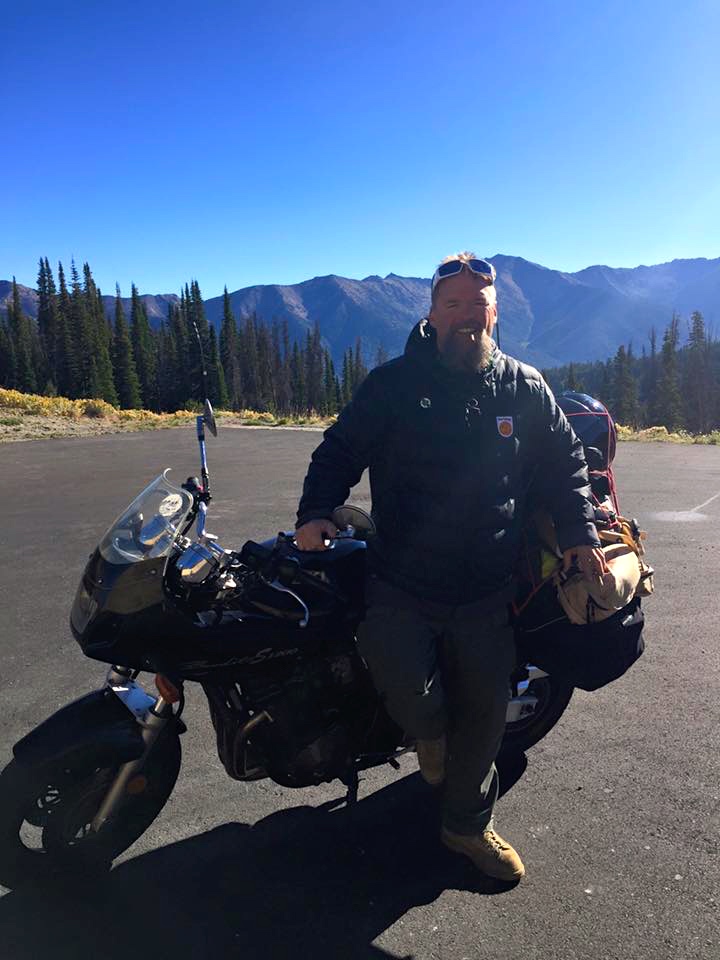 North out of the park to Calgary, it started raining. There was a mist on the highway it was raining so hard. You couldn’t make heads or tails. So I stopped off at this mall, and I thought I could still get up to Banff, but somebody said there was snow up there already.
North out of the park to Calgary, it started raining. There was a mist on the highway it was raining so hard. You couldn’t make heads or tails. So I stopped off at this mall, and I thought I could still get up to Banff, but somebody said there was snow up there already.
Next day I hop on the bike, it’s pouring down rain, and I rode down to Glacier and met a few employees. An employee from Glacier told me about where the employees sleep at Glacier, and they let me crash on the floor that night.
In the end I rode back from Missoula to Portland in one shot. It took me 10 hours. I talked to a salesman outside of Spokane, and he said, ‘If you go straight down, and you make sure to take a left here and a right here, you are gonna have some of the best riding in your universe.’ And he was right. Just a little teeny state highway, real narrow, just built for farm equipment, coming straight down to Pendleton, Oregon. Milton Freewater and then Pendleton. It was some of the best riding anywhere. You could only go so fast, and I slowed down for some of the corners, like 25, 35, 40, because they were so narrow and so tight, you couldn’t even see what’s on the other side. And the sunset was coming down, and it was warm weather. It was so incredible.
Once I got to Pendleton I knew I was running low on cash. And I hadn’t been in front of my computer to update anything on my account. So I had limited cash flow. Once I got down to I-84, it’s pitch black, probably 9 o’clock at night. I get to The Dalles and I have zero money, and my debit card is gone. It’s not working any more. So I just tell people, Hey, I’m on my way home, and I’m a little short on cash. Can you help me? I got a couple bucks to get me to The Dalles, and then in The Dalles I had to ask one more person, I was like: ‘Dude, I hate to ask you. I’m not a bum. But I need a couple bucks because I’m low on cash and I need to get to Portland, Oregon. He gave me a buck seventy-five and I was like doing jumping jacks. By that point it’s been a long day, I’ve been up since seven or eight. That buck seventy-five got me home. I didn’t get home until after midnight, so that made it 14 days.
It took me about a week to recover. I lost about five pounds, just from constantly moving. And when you’re on a bike you don’t want to eat big meals and get stuffed. You want to keep it light and keep it loose.
It turned out to be a 14-day trip, and I could do that once a year for the rest of my life. If my body allows it. And I could do it with cool people, who are open to new adventures and into meeting people and having a great time. I could just do that all day long, day after day.
My Parkinson’s reared its ugly head just a few times. But nothing major. There was one time I kinda hobbled off the bike to the rest room. I just had to kind of skip along. When I can’t walk I can run. I can always run. And I can always skip. When I feel it taking a hold of me, I say, hey, hang on one second, I just need to take it around the block. I go around the block and my head forgets that it was closing down, and I’m back.
Last modified: November 9, 2015

